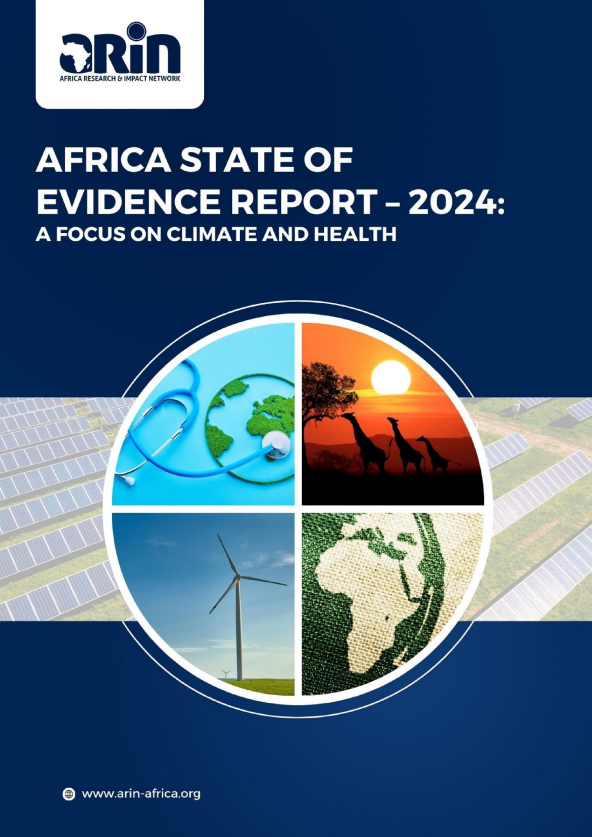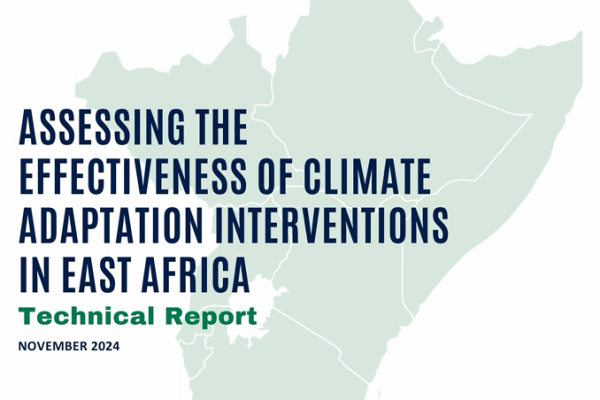Contributors: Joanes Atela, Akinyi J. Eurallyah, Humphrey Agevi, Ann S.W. Irungu, Ezekiel G. Gogo, Washington Kanyangi, and Florence Onyango.
The intersection of climate change and health in Africa reveals a complex, multifaceted landscape. Climate change presents significant risks to public health across the continent, exacerbating existing vulnerabilities and introducing new challenges. Some of the most notable impacts include droughts, desertification, coastal flooding, and declines in food production and security, each with profound health implications for diverse populations. However, the effects of climate change vary significantly across the continent’s subregions.
West Africa is particularly vulnerable to the health impacts of climate change due to the influence of the West African Monsoon (WAM), which affects several countries in the region. The movement of the Inter-Tropical Convergence Zone (ITCZ) and the El Niño Southern Oscillation (ENSO) results in warming of both sea and air temperatures, leading to heavy rainfall and floods. Similarly, East Africa, which is typically characterized by dry conditions, has experienced several severe droughts linked to ITCZ-ENSO movements. While ENSO originates in the Pacific, its effects, such as drought and water scarcity, have profound consequences for Eastern Africa. Conversely, Malawi and Mozambique have recently experienced notable flooding, despite being in a region usually associated with drought.
The literature consistently highlights Africa’s heightened vulnerability to the adverse effects of climate change, due to a combination of socioeconomic factors, environmental conditions, and inadequate health infrastructure. Research shows that climate change impacts on health in Africa are both profound and diverse. For example, Chersich and Wright note that although climate change research in South Africa has increased, only a small fraction addresses health-related issues, revealing a significant gap in the literature (Chersich & Wright, 2019). This gap is also reflected in Oladimeji’s work, which points out the limited evidence connecting climate change to health impacts, particularly after accounting for confounding variables (Oladimeji, 2023).This lack of comprehensive research hampers effective public health responses and policy formulation.
The health risks linked to climate change in Africa include an increase in vector-borne diseases, respiratory issues from air pollution, and significant mental health challenges. Ryan et al. emphasize that climate change is altering malaria transmission dynamics, necessitating the re-evaluation of intervention strategies to address shifting risk profiles (Ryan et al., 2019). Furthermore, Ezeruigbo and Ezeoha point out that climate change exacerbates existing health burdens, especially in impoverished communities where healthcare systems are already strained (Ezeruigbo & Ezeoha, 2023). The World Meteorological Organization has linked rising temperatures and shifting precipitation patterns to the spread of diseases like dengue and malaria, further underscoring the health risks posed by climate change (Ezeruigbo & Ezeoha, 2023). Moreover, the mental health consequences of climate change are increasingly recognized. Atwoli et al. argue that climate change can lead to significant mental health crises, particularly among vulnerable populations, underscoring the need for focused research and interventions (Atwoli et al., 2022). The connection between climate change and mental health is critical, as the stressors associated with environmental changes can worsen existing mental health issues and create new challenges for public health systems.
Regarding adaptive capacity, the evidence suggests that Africa’s health systems are ill-equipped to cope with the compounded effects of climate change. Chersich et al. advocate for a health-centric approach to climate change, stressing that health professionals must play a central role in identifying and addressing the health impacts of climate change (Chersich et al., 2018). This call for integration is supported by Ramirez, who highlights the significant barrier posed by insufficient knowledge of the impacts of climate change on vector-borne diseases, hindering effective health policy (Ramirez, 2017). Additionally, Africa’s socioeconomic context exacerbates the health impacts of climate change. As Ogaya et al. note, the continent’s high vulnerability is worsened by poverty, food insecurity, and inadequate governance, all of which undermine resilience to climate-related health threats (Ogaya et al., 2024). Integrating climate change considerations into public health planning is crucial to mitigating these risks and enhancing adaptive capacity (Anugwom, 2021).
Notably, over half (56%) of Africa’s public health emergencies between 2001 and 2021 were climate-related, disproportionately affecting vulnerable populations, including children, pregnant women, and the elderly (WHO, 2022; Benevolenza & DeRigne, 2019). The World Economic Forum (2024) projects that by 2050, climate change will lead to approximately 14.5 million deaths and $12.5 trillion in global economic losses, with a particularly disproportionate impact on healthcare systems in low- and middleincome countries like those in Africa. Moreover, the healthcare sector itself is a significant contributor to greenhouse gas emissions, accounting for up to 5% of global emissions, equivalent to the carbon footprint of 514 coal-fired power plants (Smith, 2022).
These challenges call for a more resilient approach to addressing climate-induced health issues in Africa. The current state of evidence on climate change and health in Africa underscores the urgent need for comprehensive research and policy responses tailored to the unique challenges facing the continent. The interplay between climate change, health, and socio-economic factors demands a transdisciplinary approach to develop effective strategies for mitigating health risks and building resilience. Given the transnational nature of climate-related health challenges, such as fluctuating temperatures and vector-borne diseases, a holistic, transdisciplinary approach is essential for an effective response (Wright et al., 2021). Developing transdisciplinary skills and fostering collaborations will be key to achieving these objectives. Therefore, this 2024 Africa State of Evidence Report aims to synthesize existing knowledge and generate new insights into how climate change is impacting public health across Africa, emphasizing the critical role of evidence in shaping effective, scalable responses.




